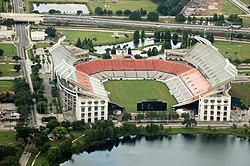| Football at the Games of the XXVI Olympiad | |||||||||
|---|---|---|---|---|---|---|---|---|---|
 Football pictogram for the 1996 Summer Olympics | |||||||||
| Event details | |||||||||
| Games | 1996 Summer Olympics | ||||||||
| Host country | United States | ||||||||
| Dates | July 20 – August 3, 1996 | ||||||||
| Venues | 5 (in 5 host cities) | ||||||||
| Competitors | 388 from 21 nations | ||||||||
| Men's tournament | |||||||||
| Teams | 16 (from 6 confederations) | ||||||||
| |||||||||
| Women's tournament | |||||||||
| Teams | 8 (from 4 confederations) | ||||||||
| |||||||||
| Editions | |||||||||
← 1992 2000 → | |||||||||
| Football at the 1996 Summer Olympics | ||
|---|---|---|
 | ||
| Qualification | ||
| men | women | |
| Tournament | ||
| men | women | |
| Squads | ||
| men | women | |
Football was contested as part of the programme for the 1996 Summer Olympics which was hosted in Atlanta, Georgia, United States from July 20 to August 3, 1996. It was the 20th edition of the men's football tournament and the first edition of the women's football tournament.
Contents
- Venues
- Overview
- Men's tournament
- Women's tournament
- Medal winners
- Men
- Women
- Match officials
- External links
- References
In the men's tournament, Nigeria defeated Argentina 3-2 in the final. In the women's tournament, the United States defeated China 2-1 in the final.
A number of firsts occurred during the 1996 Games. Alongside the first women's tournament, the games marked the first occasion in which the under-23 rules were implemented in the men's tournament. Nigeria were the first African country to win gold and only the second African country overall to win a medal of any color in football. The United States were the first country from North America to win gold and China were the first country from Asia to win a medal of any color in football.






